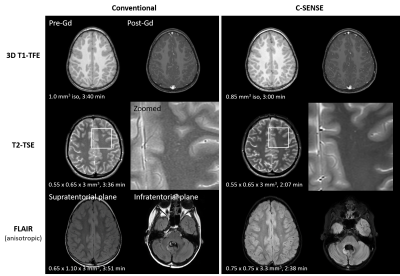Rieke Lisa Meister1, Shuo Zhang2, Michael Groth1, Julian Jürgens1, Christoph Katemann2, Jan-Hendrik Buhk3, and Jochen Herrmann1
1Department of Diagnostic and Interventional Radiology and Nuclear Medicine, Section of Pediatric Radiology, University Medical Center Hamburg-Eppendorf, Hamburg, Germany, 2Philips, Hamburg, Germany, 3Department of Diagnostic and Interventional Neuroradiology, University Medical Center Hamburg-Eppendorf, Hamburg, Germany
1Department of Diagnostic and Interventional Radiology and Nuclear Medicine, Section of Pediatric Radiology, University Medical Center Hamburg-Eppendorf, Hamburg, Germany, 2Philips, Hamburg, Germany, 3Department of Diagnostic and Interventional Neuroradiology, University Medical Center Hamburg-Eppendorf, Hamburg, Germany
Pediatric
neuro-oncological MRI benefited from compressed sensing in reduced scan
duration and better spatial resolution. Advantage for clinical practice has been
demonstrated with promise in shortened procedural time with comparable or even
improved image quality.

Figure 1. Selected examples of the pediatric
neuro-onco MRI exams in the current study comparing C-SENSE and conventional
scans.

Table 2. Spatial resolution improvement and scan duration reduction by C-SENSE in the pediatric neuro-onco MRI pulse sequences in comparison to the conventional scans. Details see text.
ACQ = Acquired; SENSE = SENSitivity Encoding; C-SENSE = Compressed SENSE; TFE = Turbo field echo; FLAIR = fluid attenuated inversion recovery; TSE = Turbo spin echo.
